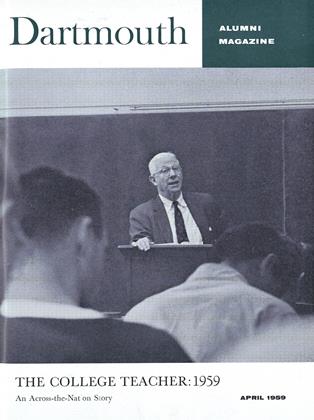IT'S always more fun to win than to lose, even at a fortieth of a cent a point, and we are very happy that our football and hockey and basketball teams took this year's Ivy League crowns. Especially so when some of the stalwarts, who as freshmen were willing to learn something about the exact placing of adverbial phrases, have translated their training into the accurate spotting of a basketball or puck. Further, we have never willingly adopted the philosophy of "After all, it's just a game," except in those too frequent years when, faute de mieux, hard times came a'knocking at the door. And we have seldom heard college administrators decrying the evils of college athletics while their own teams were winning.
So far as we have been able to discover from casual research, relationships are more relaxed than formerly, and it is no longer dirty to win. Sometimes it seemed to us that Dartmouth's dependence on innate charm and an isolated location ran a little thin, but we have never looked with disdain - only with envy —at the bursarial appointments, senatorial scholarships, boathouse telephone answering jobs, and the like that some of our Ivy mates were legitimately able to offer. We do, however, take satisfaction (especially after some of the heartbreakers we've seen) when a last-second swish in a basketball play-off (after a hassle that we lost) gave us the nod. Just as we were delighted when, in 1950, Emil Hudak clowningly flipped one in from mid-court on the final buzzer - like Nedicks — to beat Cornell 48-47.
On the other hand, we are not dismayed that we rapidly dropped out of national competition, after parochial triumphs. Dartmouth is, after all, basically an educational institution, and under the current three-term plan, with final examinations coming along every few minutes, there simply isn't time to maintain an extensive extracurricular program, along with hour exams and four classes a week and term papers. As a matter of fact, a medical decision that a boy must be immobilized for seven days with "viruspneu" (the former fad was "mono") now kills one-tenth of his term, as compared with a former one-thirteenth. We don't know how the students do it, and every time we look at an elective card or read a course description, we give thanks that we are no longer an undergraduate.
But to get back to the Ivies, we think they do a fairly clean job, as college athletics go. Sportsmanship is occasionally forgotten in the heat of combat - Achilles wasn't a very good sport and Hector was, and see where it got him - but, by and large, they are a congenial group, with high standards, common ideals, and an extraordinary spirit of harmony. They have been the target of scorn of some more famous Conferences, who have not, incidentally, invariably achieved the highest of their aspirations in the last few years; but when, from entirely different motives, the East combined with the South to kill the impractical "Sanity Code," the Dallas sportswriters said, "If we'd of had them Ivies with us in '61, we'd of won the War."
The Ivy League was originally conceived in a dingy room over a garage in East Cambridge in the spring of 1937 - more matter for a May morning. It took a mere eight years for any effective administrative notice to be taken of this effective agreement, and only seven years more for implementation. Like the sportings of Loxodonta, such matters necessarily take place on a high level, and require a good many months for results. But the results seem to us to have been happy ones. The athletic accord among Ivy institutions has been profitable, both spiritually and academically, and it will, we believe, so continue. We call to mind a recent radio interview with a Golden Anniversary bride. When asked if, during her half-century of bliss, she had ever considered divorce, she replied sweetly, "No! Murder, often. Divorce, never."
 View Full Issue
View Full Issue
More From This Issue
BILL MCCARTER '19
-
 Article
ArticleThe Hanover Scene
June 1957 By BILL McCARTER '19 -
 Article
ArticleThe Hanover Scene
October 1951 By BILL McCARTER '19 -
 Article
ArticleThe Hanover Scene
November 1957 By BILL McCARTER '19 -
 Article
ArticleThe Hanover Scene
February 1958 By BILL McCARTER '19 -
 Article
ArticleThe Hanover Scene
March 1958 By BILL McCARTER '19 -
 Article
ArticleThe Hanover Scene
June 1958 By BILL McCARTER '19
Article
-
 Article
ArticleDEBATE QUESTION DECIDED
-
 Article
ArticleRugby in California
February 1976 -
 Article
ArticleFederal Energizer
JAnuAry | FebruAry By Abigail Drachman-Jones ’03 -
 Article
ArticleAmateur Radio Club Enjoying a Revival
November 1961 By FREEMAN FORD '63 -
 Article
ArticleAssociated School News
October 1951 By Karl Hill -
 Article
ArticleSafe and Secure
JAnuAry | FebruAry By Sarah Tuff







